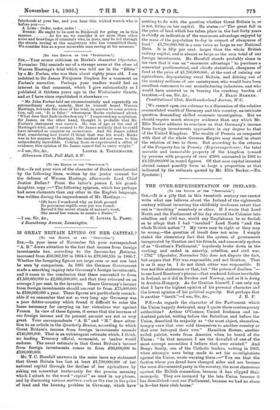THE OVER-REPRESENTATION OF IRELAND.
[To THE EDITOR Or THE " EPECTATOB."] Sin,—It is a pity that in this twentieth century one cannot write what one believes about the Ireland of the eighteenth century without incurring the childishly irrelevant retort that one is " insulting " somebody or other•. If I wrote that Lord North and the Parliament of his day steered the Colonies into rebellion and civil war, would any Englishman be so foolish as to allege that I had " insulted " Lord North "and the whole British nation" ? My views may be right or they may be wrong,—the question of insult does not arise. I simply stated the elementary fact that the system of government inaugurated by Grattan and his friends, and commonly spoken of as " Grattan's Parliament," hopelessly broke down in the working and ended in anarchy, rebellion, and civil war. "1782" (Spectator, November 7th) does not dispute the fact, but argues that Pitt was responsible, and not Grattan. That is as it may be. I do not think either was responsible. It was not this statesman or• that, but " the poison of dualism "- to use Lord Rosebery's phrase—that rendered failure inevitable in Ireland, as it did in Sweden and Norway, and as it is doing in Austria-Hungary. As for Grattan himself, I can only say that I have the highest opinion of his personal character• and the lowest opinion of his political sagacity. But perhaps that
is another " insult."—I am, Sir, &c., J. R. F.
P.S.—As regards the character of the Parliament which the Union happily destroyed, may I quote three contemporary authorities ? Arthur O'Connor, United Irishman and un- doubted patriot, writing before the Rebellion and before the Union, described its majority as "the most abject, shameless, hungry crew that ever• sold themselves to another country or• that ever betrayed their own." Hamilton Rowan, another exiled patriot, wrote from America when he heard of the Union : "In that measure I see the downfall of one of the most corrupt assemblies I believe that ever existed." And Denys Scully, one of the Catholic leaders, writing in 1803, when attempts were being made to set his co-religionists against the Union, wrote warning them :—" You see that the faction whom you dread have changed sides and are become the most discontented party in the country, the most clamorous against the British connection, because it has clipped their monopoly. They are incensed by the late Union because it has demolished—not our Parliament, because we had no share in it—but their club house."










































 Previous page
Previous page